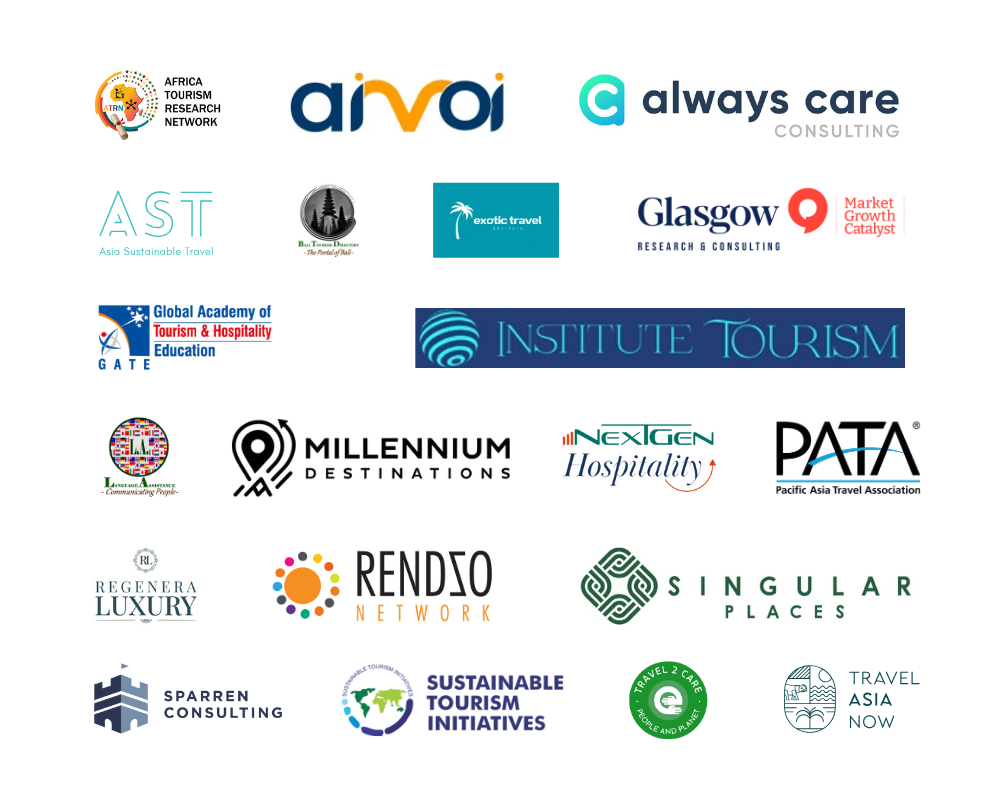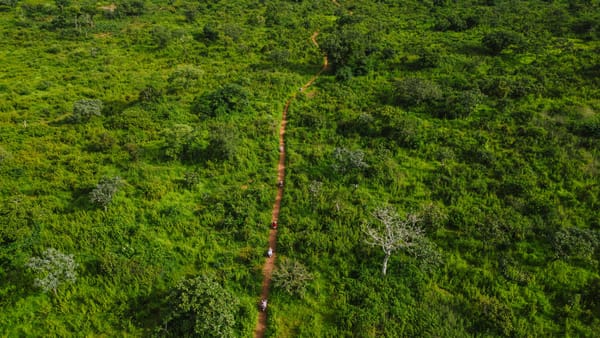Europe is the past, Asia is the present, Africa is the future


Dear reader,
After Meaningful Tourism being a major topic at conferences and fairs in Hong Kong SAR, Beijing and Bangkok in the month of August, September will see more strategic steps forward for the Meaningful Tourism movement. With the latest group of newly certified trainers, the community has grown to 48 trainers, and the number of organisations partnering with the Meaningful Tourism Centre is increasing as well.
In Asia, Meaningful Tourism conferences in Kazakhstan and Mongolia are in the making; the short-term development, however, concerns the youngest continent on the planet: Africa.
Africa is the next big success story in international tourism; however, mistakes made by other destinations should be avoided by using the Meaningful Tourism approach.
To help the continent move in the right direction when it comes to the biggest tourism source market in the world, the China–Africa Meaningful Tourism Partnership (CAMTP) has been established.
Many Chinese travellers are looking for new activities and destinations, moving away from overcrowded European destinations and hostile policies in the USA.
They do not travel in big groups anymore, and they do not focus only on sightseeing and shopping anymore.
If African, especially Sub-Saharan, destinations can offer special interest tour products, from culture, food, music and traditional healing to meetings of young start-up entrepreneurs, designers and software developers from both sides, the competition between interchangeable safari and beach destinations and the race to the bottom in pricing can be avoided.

Making products China-ready, showing up properly on Chinese platforms, and training and empowering local players with the right skills, African destinations can capture outsized economic and community benefits.
The CAMTP brings together the knowledge and networks of the African members of the Meaningful Tourism community and the decades of experiences in Chinese outbound tourism of the leader of the Meaningful Tourism movement, Prof. Arlt, and several community members, including the initiator of CAMTP, Richard Julius of OCG International.
The Meaningful Tourism Centre has two parts: Next to the MTC working for Meaningful Tourism, there is also the COTRI China Outbound Tourism Research Institute, which was founded by your humble editor 21 years ago in 2004.
CAMTP aims to become the thought leader for Chinese outbound tourism organised in a Meaningful Tourism way for the continent of Africa, especially the Sub-Saharan part.
CAMTP, as a non-profit association, is in the process of being registered in Switzerland with a professional Secretariat based in Kathmandu. It will rally governments, businesses, communities and tourists around a single idea: Meaningful Tourism that creates measurable benefits and satisfaction for all six stakeholders—tourists, host communities, employees, companies, governments and the environment.
The mission and vision centres on catalysing a new era of China–Africa tourism by enabling innovation, building capacity, aligning policy, and creating measurable value for all—while protecting cultures and nurturing the planet by building a Meaningful Tourism Economy for Africa.
All private and public entities are invited to join the partnership with CAMTP to pilot Meaningful Tourism projects, build market readiness, and open new demand pathways between China and Africa.
As always, all best wishes from Prof. Dr. Wolfgang Georg Arlt and the whole Meaningful Tourism Weekly team in Kathmandu and in Manila!


Secrets of Community-Based Tourism Success: Monitoring & Evaluation
Author: Giang Phi, PhD

Community-based tourism (CBT) often promises more than revenue - it promises empowerment, cultural preservation, and sustainable growth. Yet so many projects start with excitement and energy, only to encounter unexpected challenges. Locals invest time, renovate homestays, and prepare cultural experiences. Visitors arrive, revenues flow, but soon, cracks appear: conflicts over shared resources, uneven benefits, services that fail to meet expectations, lack of connections to the market. On the surface, tourism seems successful; underneath, the foundation is shaky.
This article discusses tracking what truly matters in CBT development. Monitoring and Evaluation (M&E) are not just about counting visitors, they are about understanding who benefits, which services work, and where interventions are needed. Linking M&E to governance mechanisms transforms data into action, enabling projects to adapt, distribute benefits equitably, and plan strategically for the future. Yet, an audit of major guidelines and frameworks for CBT development revealed a clear oversight of M&E.
Before, and during any CBT development, these are the key questions for M&E framework:
- Are there mechanisms in place for monitoring the performance and impacts of CBT initiatives?
2. Does the framework include channels for community feedback and continuous improvement?
3. Are there clear indicators and targets for measuring the success of CBT projects?
What to Monitor and Evaluate
Monitoring and evaluation in CBT should capture outcomes across multiple dimensions, often linked to key sustainable development pillars:
- Economic: Who benefits from tourism revenue? What is the percentage of profit that stayed and was reinvested in local services/employment? Are guests satisfied? Do they return?
- Social & Governance: Do diverse members in the local communities have a voice in tourism decision-making processes? How are conflicts resolved, and how transparent is decision-making?
- Cultural: Are traditions and local knowledge preserved? Are cultural offerings meaningful for both residents and visitors?
- Environmental: How are resources managed? Is waste minimized? Are the local ecosystems protected or improved from tourism impacts?
“Tourism numbers are vanity metrics; real success is measured in resilient livelihoods, cultural preservation, distribution of benefits and returning visitors.”
Timing Matters: CBT Development Stages
Monitoring and evaluation priorities shift as CBT projects evolve:
- Early stage (0–2 years): Focus is often on infrastructure, building the base products and service delivery, and establishing mechanisms for community participation. Early M&E helps identify weak spots before they become systemic problems.
- Mid stage (3–5 years): Emphasis moves to service quality, product diversification, and community capacity building. Monitoring now tracks benefit distribution, governance functionality, and product-market fit.
- Long-term stage (5–10 years+): Success brings new challenges. External investors may enter, threatening local control, or many households may invest rapidly without sustainable plans. Monitoring must track power dynamics, mechanisms of benefit distribution, environmental pressures, and market positioning to prevent conflicts or cultural/environmental degradation.
“Monitoring is not static. What you measure in year one won’t tell you what matters in year five. Timing and context define the value of your data”.
Governance: The Backbone of M&E
Governance isn’t just a checkbox—it’s the foundation that allows monitoring to function. Two villages in Ha Giang, Vietnam, illustrate this vividly:
- Ha Thanh Village: Weak governance led to conflicts over shared spaces, ad hoc decision-making, and inequitable distribution of benefits. Without clear roles or responsibilities, monitoring became a formality, limited data were collected, and rarely translated into action.
- Nam Dam Village: A community-based tourism management board with 22 members operates under a tourism cooperative. The villagers oversee the board, which is licensed by the commune. The cooperative and village management boards make vital decisions. Pricing and infrastructure development are approached collectively. The cooperative oversees pricing, and penalties are imposed for individual price increases. However, there has been rapid growth in number of local homestays post-COVID, while local products/services remain underdeveloped. The situation requires close monitoring and intervention if necessary.
Strong governance ensures that M&E doesn’t just collect numbers - it guides adaptation, equitable benefit distribution, and sustainable development.
Useful Monitoring & Evaluation Tools
Monitoring and evaluation tools don’t have to be expensive or high-tech to be effective. The most successful CBT projects rely on a mix of qualitative and quantitative methods, combining community insight with measurable data.
Practical tools include:
- Participatory Scorecards: Engage locals in evaluating performance collaboratively, capturing perspectives that numbers alone can’t show.
- Surveys & Feedback Forms: Collect visitor and community feedback to quantify satisfaction and identify trends.
- Observation & Interviews: Gather rich, qualitative insights on social, cultural, and governance outcomes.
- Checklists & Logs: Track key indicators like revenue, service quality, and resource use with simple record-keeping.
- GIS & Mapping Tools: Visualize environmental impacts and resource allocation without requiring complex software.
- Management Dashboards: Use simple spreadsheets or basic digital tools to organize data, visualize trends, and inform decisions.
The best M&E systems are practical, accessible, and tailored to the community’s capacity, ensuring data is used to guide real change, not just fill reports.

Highlights and Insights from PATA Travel Mart 2025
After a successful Meaningful Tourism Transformational Game Workshop and the PATA Knowledge Forum 2025 under the theme “Designing Meaningful Tourism for a Changing World,” two days of the PATA Travel Mart 2025 (PTM 2025), the Pacific Asia Travel Association (PATA)’s flagship international B2B travel trade event, officially commenced on Wednesday, August 27.
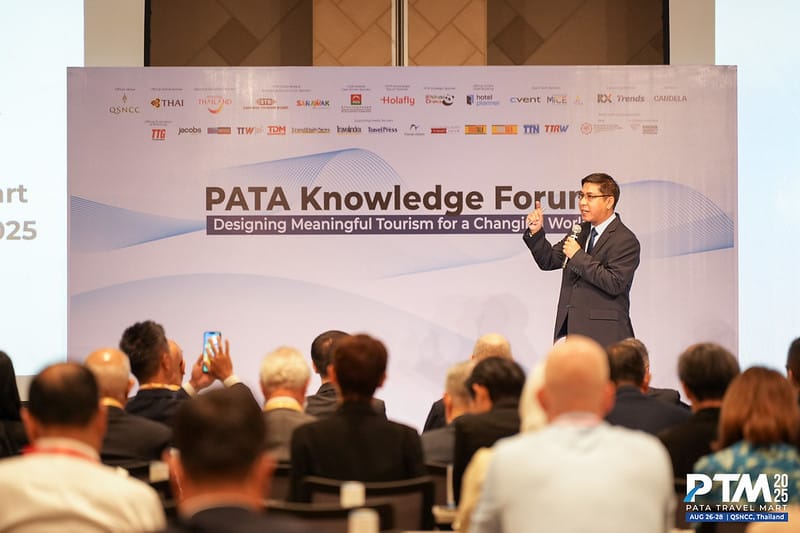
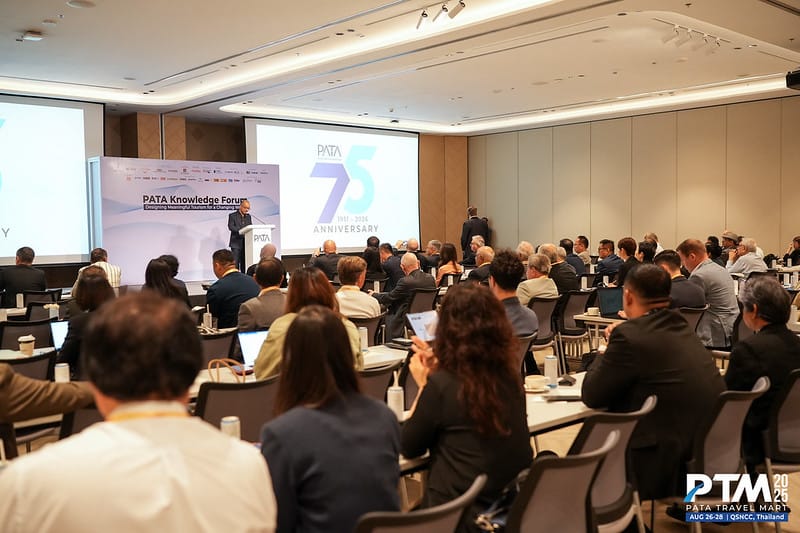
The Forum created a lot of interest, and it was a pity that it was simply declared "sold out" instead of moving to a bigger conference room providing more space for participants.
The whole event welcomed over 1,000 delegates from more than 50 destinations — ranging from the Solomon Islands and Italy to Nepal and China — including over 400 exhibitors from 225 organisations across 30 destinations, with more than half of them new to PTM, including the Meaningful Tourism Centre.
The Mart also brought together 225 buyers from 218 organisations across 41 source markets, about two-thirds of whom are participating for the first time.
PTM 2025 was marked by the quality of connections and exchanges that took place. As buyers, exhibitors and leaders of Asia Pacific tourism gathered, the event fostered the sharing of insights, the building of meaningful business relationships, and the co-creation of solutions to industry challenges.
“It is my great pleasure to welcome you all to PATA Travel Mart 2025 here in the vibrant city of Bangkok, Thailand. This week, we come together to connect, collaborate, and collectively shape the future of travel and tourism in the Asia Pacific region,” stated PATA Chair Peter Semone, during the mart’s official opening ceremony.
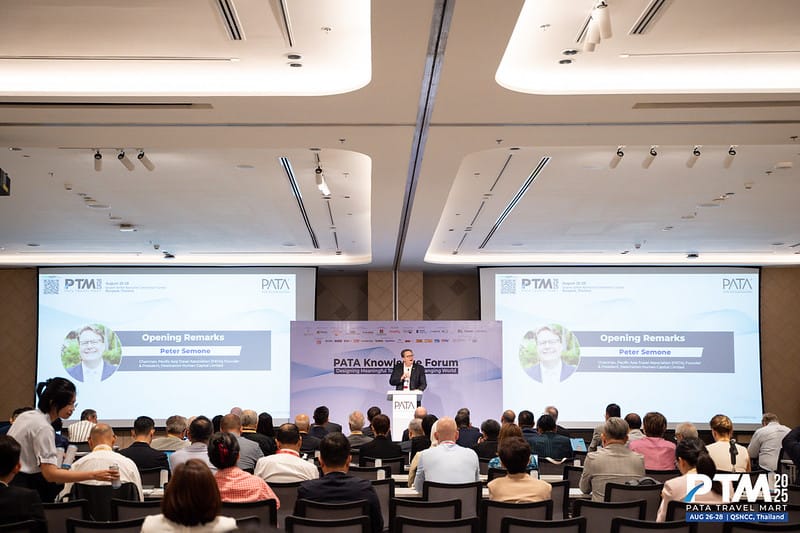
“Yesterday, over 1,000 delegates began arriving from across the globe, reflecting the scale and collaborative spirit of this event. It is a testament to the continued relevance of PATA Travel Mart, bringing together stakeholders from across the Asia Pacific and beyond to exchange knowledge, build networks, and grow our industry.”
The spectacular QCNCC conference centre and its convenient location in Bangkok contributed to the success of the event.
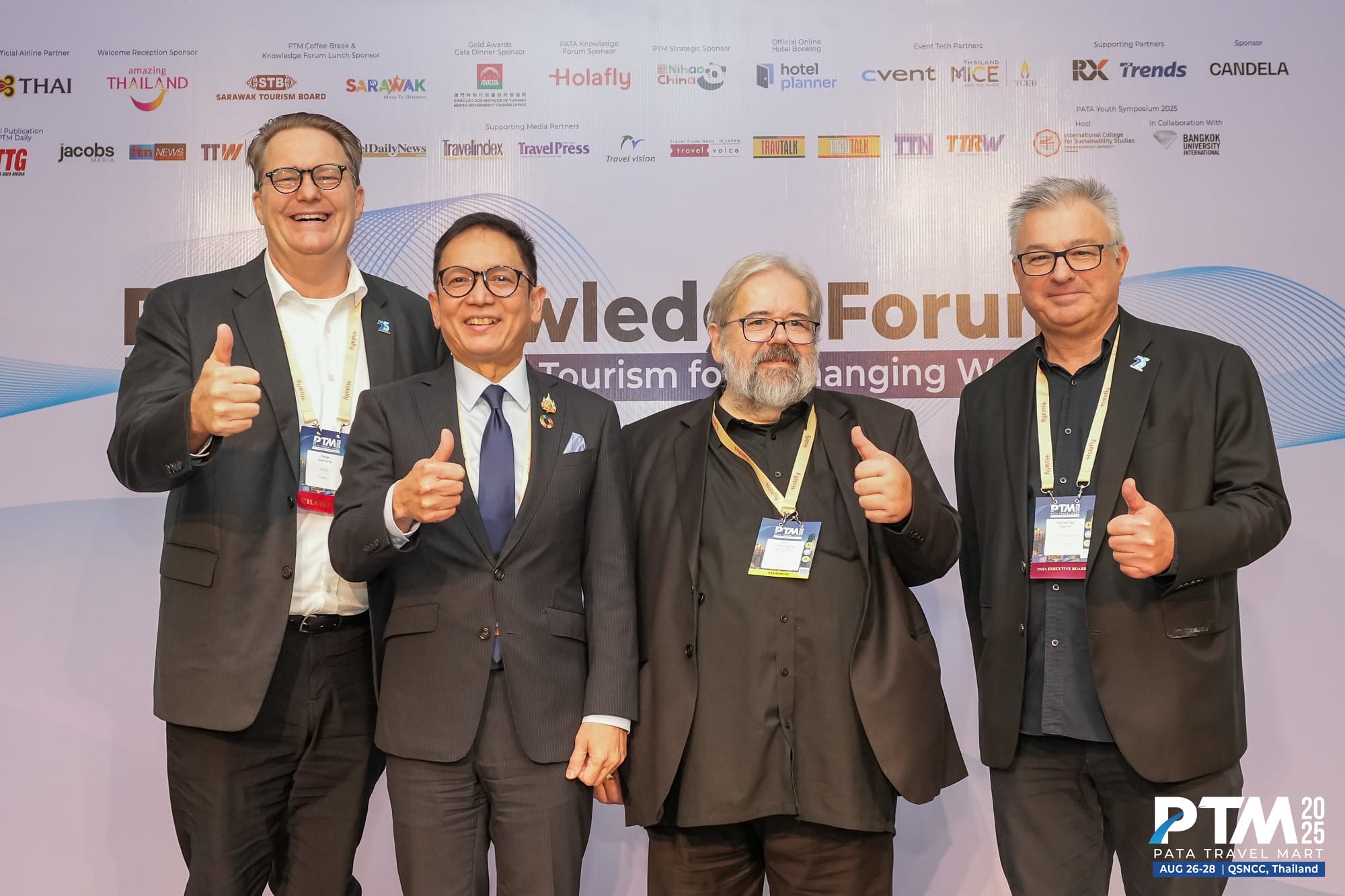
Next year, it will again be more difficult to reach the PTM, which will be held in Kuching, Sarawak, Malaysia. A permanent venue in Bangkok would probably be preferable, but there are obvious economic reasons to accept the hospitality of different local hosts.
During the PTM 2025, a discussion emerged again about whether the current format might need to change in times of AI, Zoom meetings, and social media.
It seems that either there should be a fair with stands like it is now and people moving around with B2B visitors allowed in on both days and exhibitors making their own appointments freely if they want, or having just tables and chairs for pre-fixed "speed-dating" meetings, as is done in many similar events already.
The current mixture of both formats with restricted access on Day 1 seems a bit old-fashioned, while the progressive extinction of the "Travel Agency" as a business model will make the "buyer-seller" dichotomy obsolete sooner or later.
In line with other tourism fairs, the conference part becomes more and more important and should be given more time and space, with several "satellite" round-table talks and other more interactive forms for specific topics during the fair days.
For the Meaningful Tourism Centre, partnering with AIRoi Co for the fair booth, the participation in all its parts, from the open workshop to the Forum and the fair, exceeded expectations.
Thanks to PATA for the perfect organisation and to all partners and friends who visited MTC during PTM 2025!
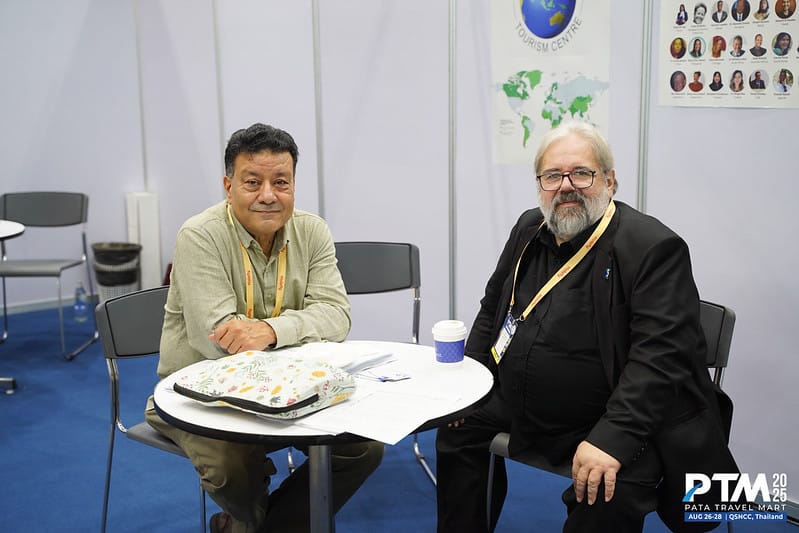
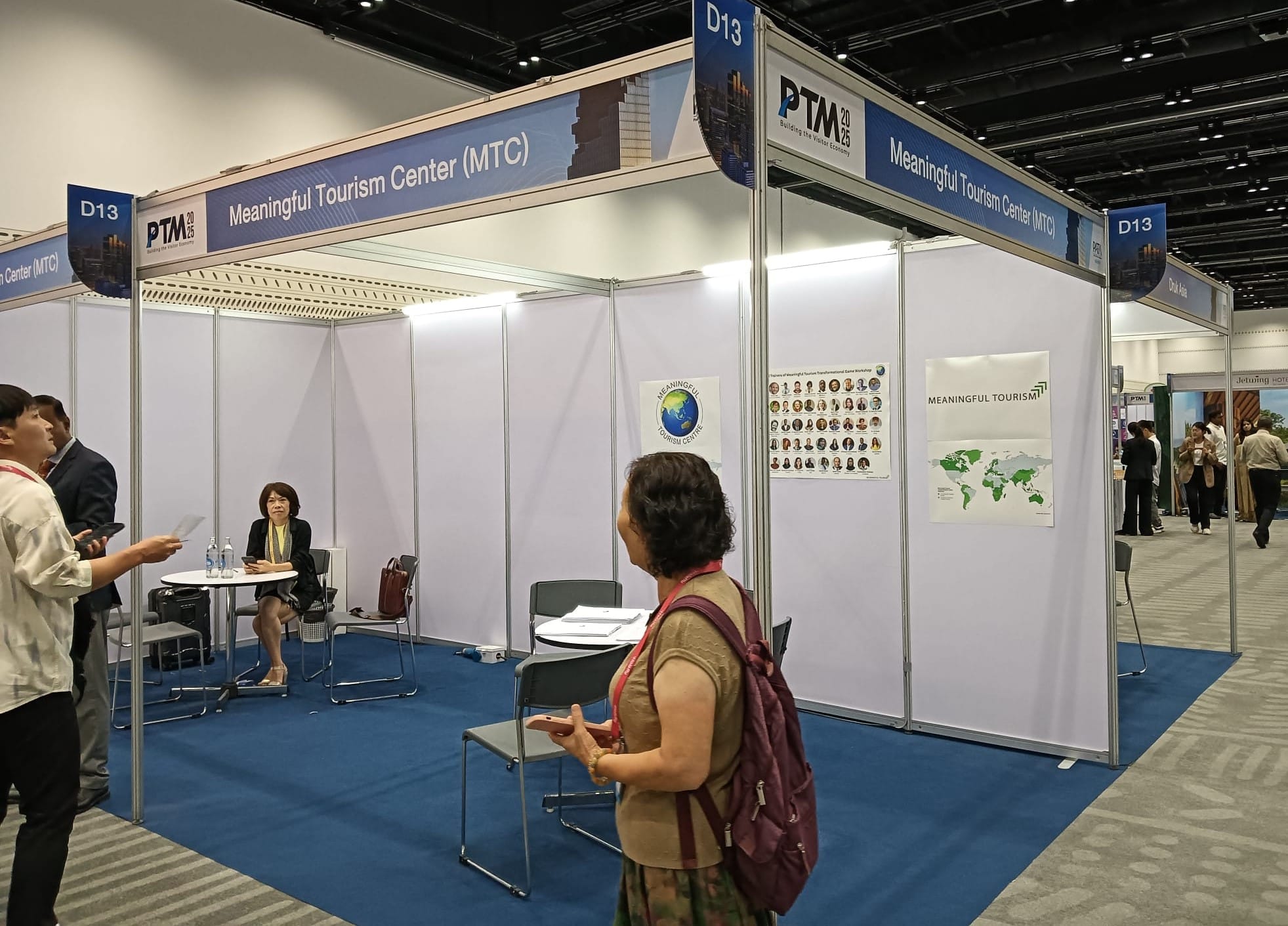
The Meaningful Tourism Transformational Game Workshops are structured to help develop SMART KPIs, creating measurements which can also be used to provide the data needed for the different reporting formats.
Global Sustainability Reporting Landscape
The landscape of sustainability reporting is evolving fast.
What began as a collection of voluntary initiatives is moving toward a structured system of mandatory disclosure.
Financial relevance has become a central driver, with regulators demanding that companies account for sustainability risks and opportunities.
At the same time, the concept of double materiality is gaining ground, requiring disclosure on both financial impacts and outward consequences for society and the environment.
This approach reflects the growing expectation that companies are accountable for value creation and value impact simultaneously.
Interoperability has become a priority. Reporting systems are being designed to align and connect, allowing information to flow consistently across markets.
This convergence is reducing duplication, improving comparability, and supporting decision-making by investors, regulators, and other stakeholders.
The direction of travel is toward the integration of sustainability and financial reporting within one consolidated framework.
For business, this means understanding that the evolving architecture of disclosure is no longer optional but a prerequisite for compliance and credibility.
Those who can map and adapt to this landscape will not only meet regulatory demands but position themselves to use disclosure as a strategic resource.
Sustainability reporting is becoming part of the foundation of corporate accountability, linking financial performance with broader economic, environmental, and social outcomes.
The transition is clear and accelerating, with interoperability and materiality at the center of the next phase of corporate reporting.
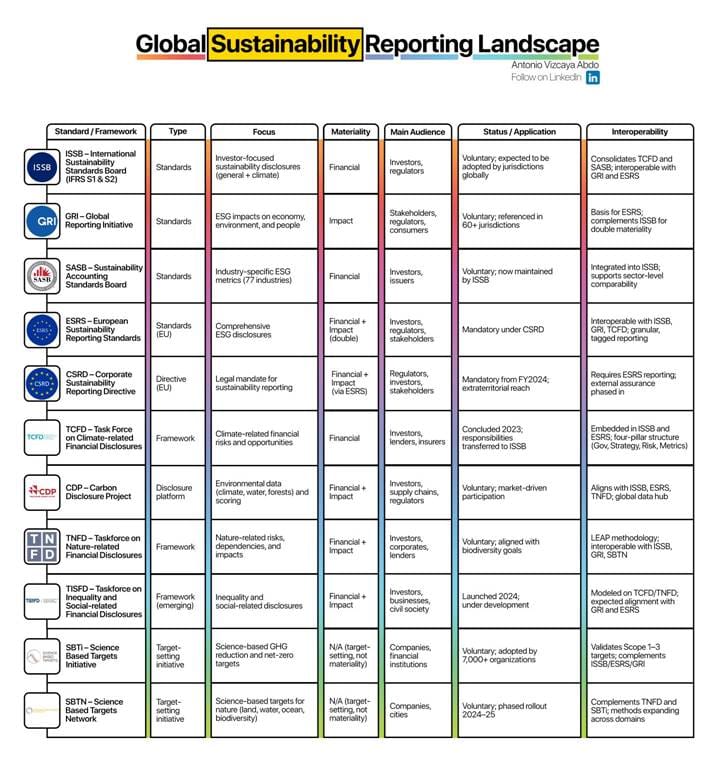
Author: Antonio Vizcaya Abdo

Tourism Measurement Needs an Overhaul, Say Industry Leaders
By TIN Media | International Published on 2 September 2025

Tourism success can no longer be judged solely by the number of visitors or their spending power, but must also take into account its wider impact on communities, culture, and the environment. This was the resounding message from experts at the Pacific Asia Travel Association (PATA) Knowledge Forum held earlier this week.
PATA Chairman Peter Semone called on Asian governments to move away from outdated growth models that prioritise destination marketing and increasing visitor arrivals. With the region having already undergone rapid expansion, he warned that the current approach is unsustainable.
“We cannot continue down this path much longer,” Semone cautioned. “The future lies in cultivating quality tourism that is both manageable and measurable. PATA’s role is to support governments in developing innovative strategies that align tourism growth with national priorities, ensuring benefits for all stakeholders—not just the bottom line.”
Supporting this view, Wolfgang Georg Arlt, Executive Director of the Meaningful Tourism Center, highlighted the urgent need for transparency and new Key Performance Indicators (KPIs). These, he stressed, should measure not only the economic contribution of tourism but also its value to local communities. Importantly, he noted, residents must play a central role in shaping how tourism evolves in their own regions.
From Thailand, Siripakorn Cheawsamoot, Director General of the Designated Areas for Sustainable Tourism Administration (DASTA), shared an example of sustainable planning at Phu Kradueng National Park in Loei Province. Plans for a cable car to the summit are designed not only to improve visitor access but also to reduce environmental pressures by cutting down on waste left behind by hikers.
Industry leaders at the forum agreed that redefining tourism metrics is critical to ensuring the sector grows in a way that balances economic benefits with cultural preservation and environmental stewardship.
This story was originally published by Tin Media.

Meet the Trainer for the Meaningful Tourism Transformative Game Workshop
Emmanuel Frimpong, Trainer for Ghana, Africa

Emmanuel Frimpong is a Tourism and Hospitality Consultant, Analyst, and Lecturer at HOTCATT under the Ministry of Tourism, Arts, and Culture. He is the Founding President of Africa Tourism Research Network (ATRN) and Co-Founder/Vice President of the Africa Medical Tourism Council (AMTC). He serves as CEO of Pishon Consult Ltd, President of People of Purpose (a youth-focused NGO), and holds key roles in various global tourism and ecotourism organizations, including GAEST, WATO, WAEN, and IH. He is also the Country Head for the Pan African Heritage Museum (PAHM) and sits on its International Board.
Emmanuel is a CBT Curriculum Development Expert, a Global Ambassador for Tourism Education, and a Patron of GATHS. Also, he was recognized as the Most Influential Tourism Development Expert of 2023 by the Humanities Chamber of Commerce. He holds an MBA from the University of Leicester, a BA from KNUST, and other qualifications in hospitality and tourism management.
The Meaningful Tourism Weekly asked Emmanuel: What is the current situation of tourism in Thailand and how can the Meaningful Tourism Paradigm help to support its development?
His answer:
The Potential Impact of Overtourism in Europe on Africa
Overtourism has become a pressing challenge for many European destinations such as Barcelona, Venice, and Amsterdam. These cities face overcrowding, environmental degradation, rising costs of living and strained infrastructure due to the influx of millions of visitors annually. While overtourism is viewed negatively in Europe, it presents both opportunities and challenges for Africa’s tourism sector.
One significant impact is the shift in tourist flows. As European destinations struggle to balance visitor numbers, travelers are increasingly seeking alternative, less-crowded regions. Africa, with its vast landscapes, cultural diversity and emerging destinations, stands to benefit from this redirection. Countries like Kenya, Ghana, South Africa, and Tanzania can attract tourists who desire authentic, less commercialized experiences.
Secondly, overtourism in Europe has influenced policy and awareness in Africa. European debates on sustainability, responsible tourism, and carrying capacity have heightened global awareness. African tourism stakeholders are learning from Europe’s challenges to adopt proactive strategies such as eco-tourism, community-based tourism, and heritage conservation to avoid similar pitfalls.
However, there are also risks. The potential influx of tourists fleeing overcrowded European destinations may put pressure on Africa’s still-developing infrastructure. Without careful planning, Africa could replicate Europe’s mistakes, facing environmental strain, cultural dilution and uneven benefits for local communities.
In addition, overtourism in Europe shapes global tourism narratives and funding priorities. International organisations are channeling resources into sustainable tourism initiatives, many of which Africa can leverage. This creates an opportunity for the continent to position itself as a responsible and attractive destination.
In conclusion, while overtourism has strained Europe’s tourism industry, it provides Africa with lessons and opportunities. By embracing the concept of Meaningful Tourism practices, Africa can benefit from shifting tourist flows while safeguarding its natural and cultural assets.
MTC Certified Trainers
Please find below the updated overview of all our Certified Trainers for the Meaningful Tourism Transformational Game Workshop and the updated World Map showing the countries directly and indirectly covered at the moment.
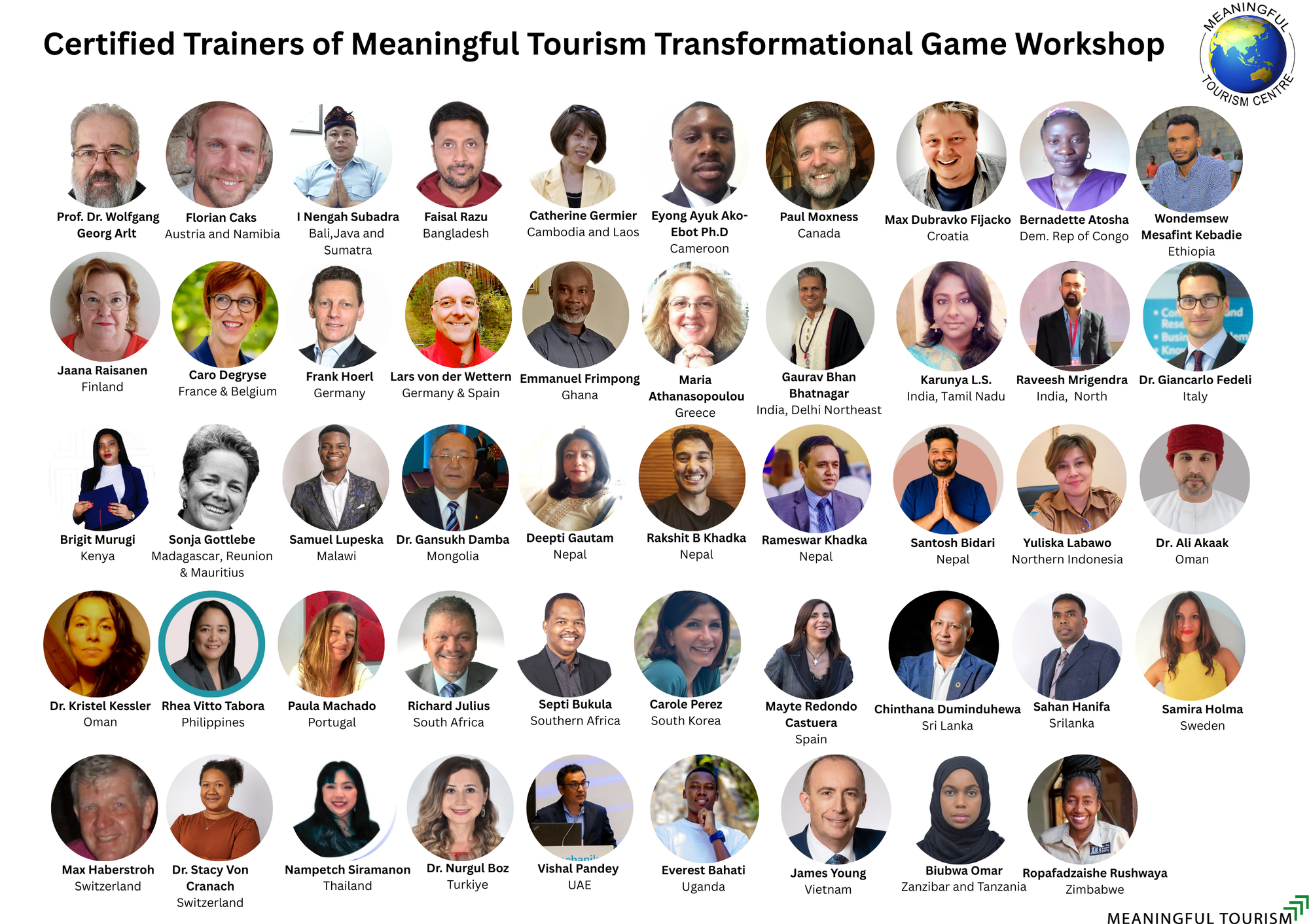
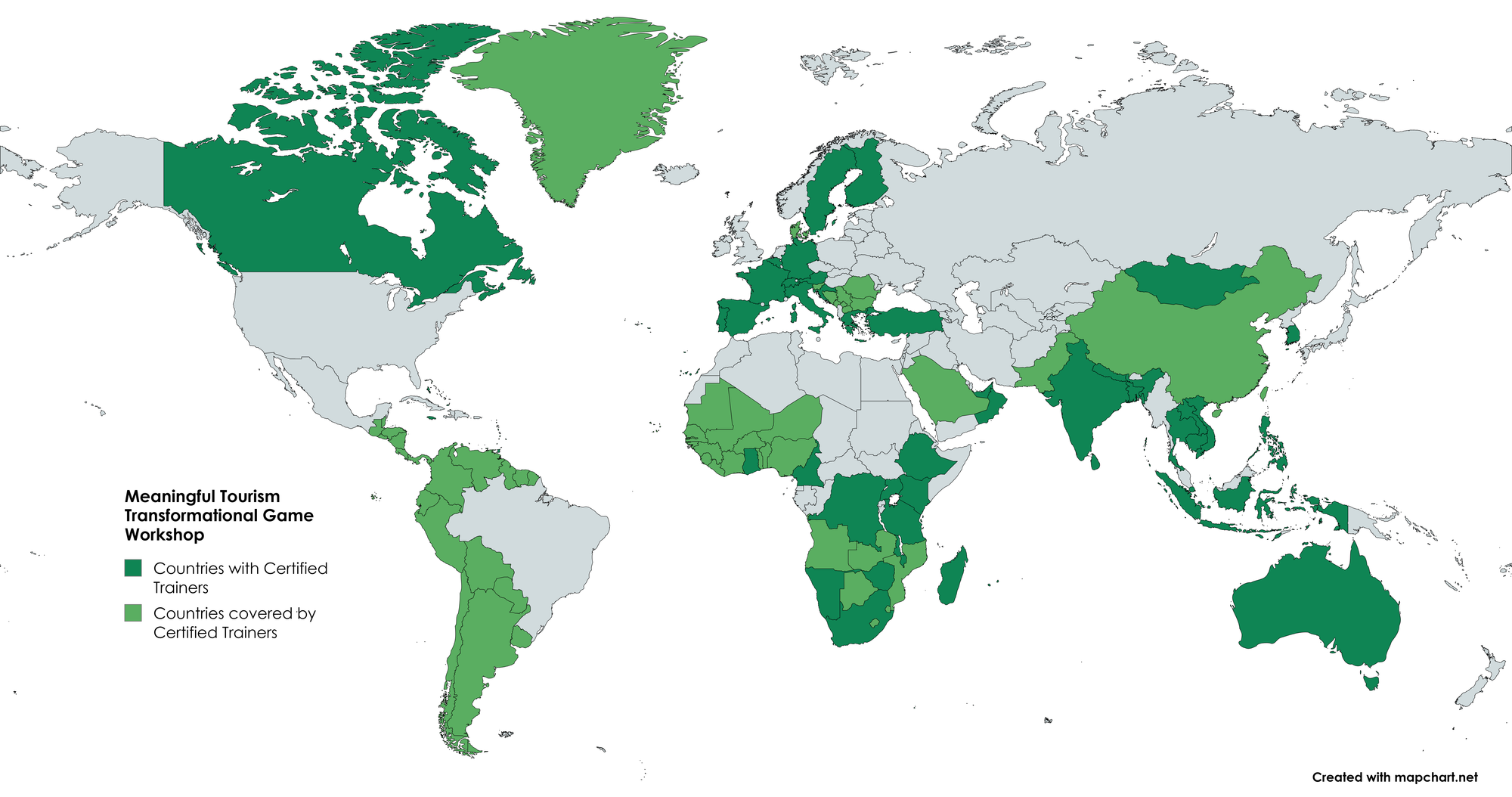
With almost 50 Certified Trainers, many countries and regions of the world are already covered. However, MTC continues to look for professionals with experience in training or lecturing and a passion for sustainable tourism.
If you are interested in becoming a Certified Trainer for the Meaningful Tourism Transformational Game Workshop for a country not marked in dark green on the map above, please contact us at office@meaningfultourismcentre.org.

Meaningful Tourism Trainer Paul Moxness to Present the Meaningful Tourism Paradigm at the Canada Adventure Seeker Club
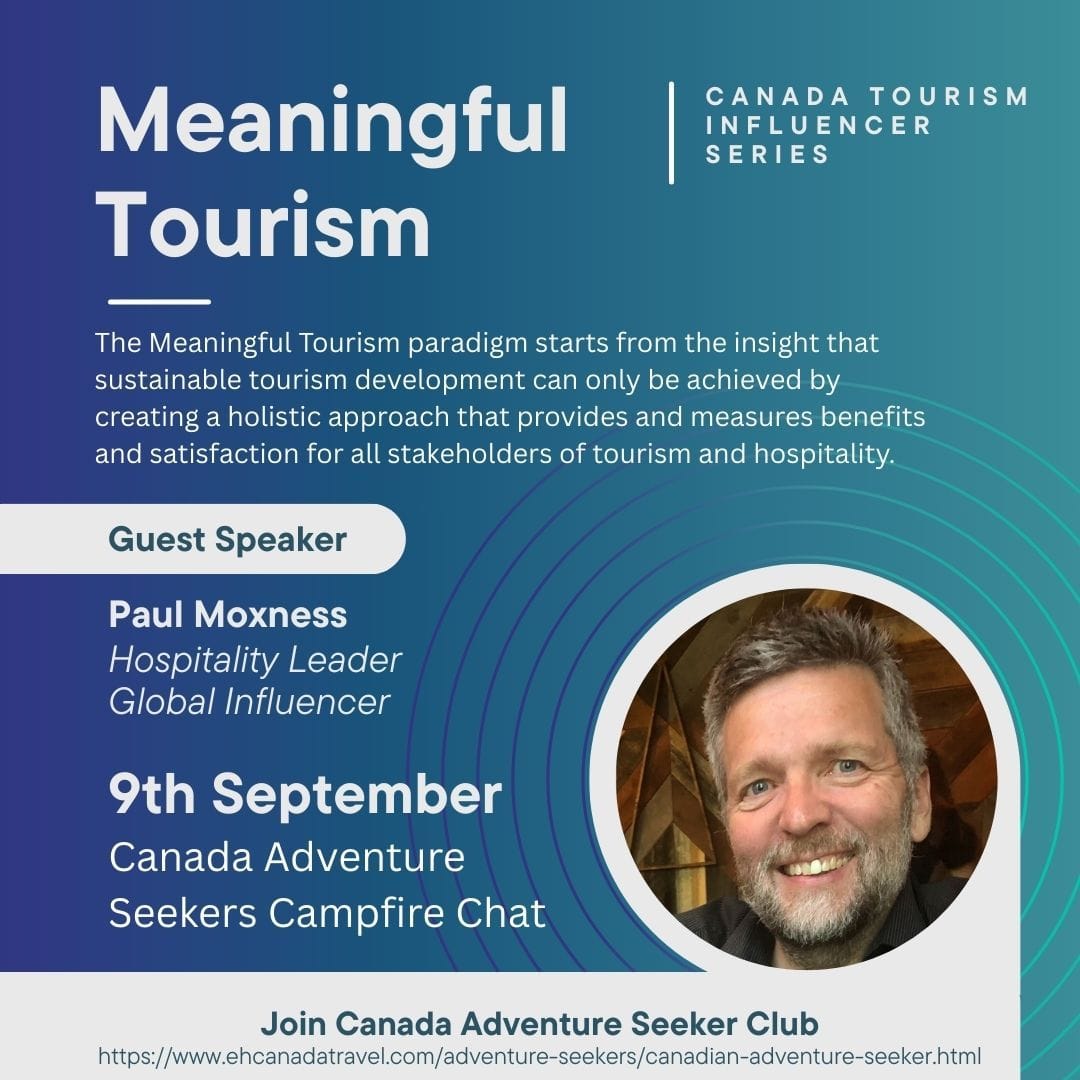
Meaningful Tourism Trainer Paul Moxness will be speaking at the Canada Adventure Seeker Club Campfire Chat on September 9, 2025, to present “The Meaningful Tourism Paradigm.”
In this exclusive session, Paul will explore how meaningful tourism goes beyond being a trend, offering a comprehensive, sustainable approach that benefits all stakeholders—travelers, hosts, businesses, communities, and the environment.
Paul will share how this groundbreaking framework measures real benefits and lasting satisfaction for all stakeholders in tourism and hospitality.
Note: This session is exclusively available to influencers participating in the Canada Adventure Seeker Club Campfire Chat.
Meaningful Tourism Transformational Game Workshop at World Travel Market, London
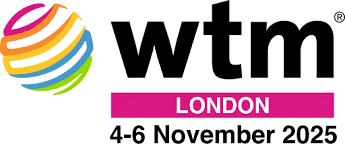
World Travel Market (WTM) in London is one of the must-attend annual events for key players in the tourism industry. The Meaningful Tourism Centre will offer a special Meaningful Tourism Transformational Game Workshop on the day before the start of WTM 2025, on November 3, 2025, from 9:00 to 16:00 hours. The workshop will be conducted by Prof. Dr. Wolfgang Georg Arlt FRGS FRAS, the founder of MTC.
There are only 30 seats available, so if you already know that you will attend WTM 2025, make sure you arrange your schedule to arrive on time for the training workshop on Monday, November 3, 2025.
Book your seat now and enjoy the Early Bird fee.
Venue: Central London, details to be advised. Transport from/to the hotel or Excel London can be arranged on request at a special rate.
• Early Bird participation fee for bookings paid before September 30, 2025: 175 Euros per person
• Full participation fee for bookings starting October 1, 2025: 200 Euros per person
VAT included if applicable.
Two or more seats booked at the same time enjoy an additional 10% discount.
Please note that payments are non-refundable. However, a change of participant is possible without additional fee until one day before the training workshop.
The participation fee includes training workshop participation, a certificate of participation, one year of free access to all content, including the Meaningful Tourism Weekly Library reserved for paid subscription holders, coffee/tea, cookies, and a vegetarian and non-vegetarian lunch buffet.
On the evening of November 3, 2025, there will also be a (self-paid) dinner followed by drinks with an opportunity to network with participants and to meet several of the Meaningful Tourism trainers from different countries.
For bookings, please contact office@meaningfultourismcentre.org.
Bookings will be closed once 30 reservations have been reached. Book today and enjoy the Early Bird fee.
#Africa #PATATravelMart2025
About Meaningful Tourism Weekly
Meaningful Tourism Weekly, published every Thursday by Meaningful Tourism Centre (MTC) - London and Kathmandu, recently partnered with Travel Asia Now, led by Rhea Vitto Tabora. This collaboration enhances the newsletter’s professional production and distribution, bringing added value to our readers.
Each issue features the Meaningful Tourism Weekly Editorial, updates on MTC activities, a Best Practice Example, a portrait of an MTC-certified trainer, news about upcoming events, and occasionally additional op-ed pieces from guest authors. Carefully selected news items, including videos and podcasts, are also included, along with links to their original sources in the Meaningful Tourism News section.
Subscription to Meaningful Tourism Weekly is free, with the addition of a paid content section that includes a library of surveys, exclusive articles, conference presentations, and statistical data, offering subscribers invaluable resources.
Sponsorship opportunities are available for those interested in supporting this initiative.
For more information about MTC's training programs, market research, product adaptation, consulting services, conferences, strategy development, and marketing, visit our website or email us at info@meaningfultourismcentre.org.

